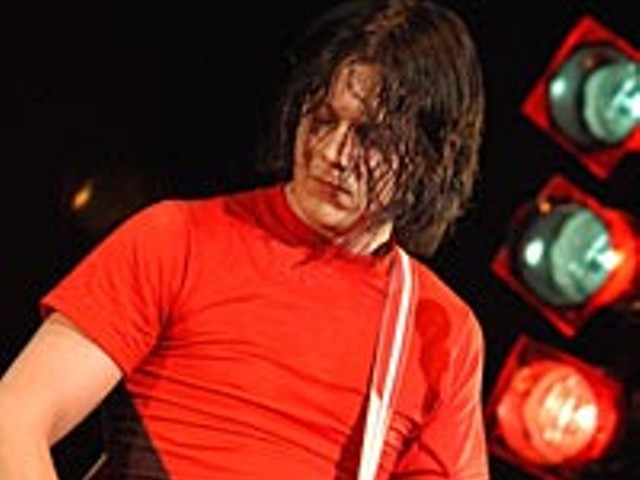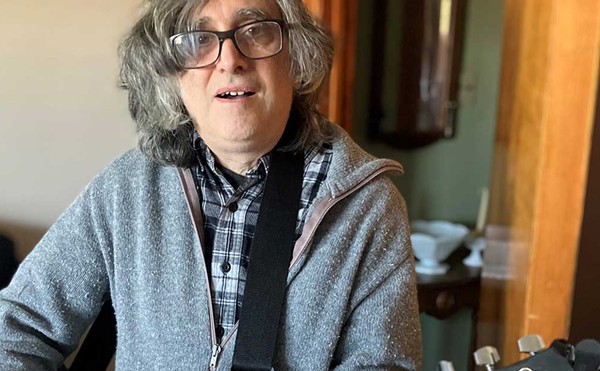This time of year, the activity room is a forest of synthetic pines. Each tree is covered in lights, garnished with crocheted snowflakes and topped with a beaming cherub. The air of the room holds a peculiar potpourri — something like a blend of sugar cookies, floral perfume and disinfectants. After lunchtime, the residents take their places for what’s referred to as a “special music performance.”
As the stragglers get to their seats, the band assembles around the piano and tunes up. Four snaps later, they start swinging through a set of cheerful holiday classics and dusty pop standards. The wildest audience members bop their heads to the beat or tap along. The tamest ones just stare into space. If Joe Hunter believed in such a thing, this might qualify as a bad gig.
“When you’re a working musician any gig is a good gig,” Hunter says after the show, a one-off holiday gig at an East Side nursing home. The pianist has a knack for blurting out those kinds of grandfatherly mantras. At a quick glance, Hunter could be a resident here himself. His agile playing is surprising for somebody his age, and at 76 he’s probably younger than some of those in the crowd.
Hunter’s career hasn’t been limited to charity gigs for the aged. It was, in fact, 46 years ago that the gent climbed the four wooden stairs of 2648 W. Grand Blvd. and permanently changed the face of popular music. He was a founding player at what would become Hitsville U.S.A.
The day after the nursing home gig, Funk Brothers’ Hunter and drummer Uriel Jones are cracking jokes at the Majestic Cafe. Jones orders the club sandwich. Hunter gets the salmon cakes and eats them with ketchup.
It’s obvious to this writer that the two men are pleased that people are finally listening, that the Funk Brothers’ story has been told. So the mood at the table is good. Between bites the two men offer a mélange of mind-blowing anecdotes: From the old days of sneaking underage Stevie Wonder into his first bar, to last year, when they gigged for President Bush and Colin Powell. The countless stories brim with quick-witted retorts and gentle teasing.
“One time I played a gig in Phoenix, Pennsylvania,” Hunter says. “I wasn’t even playing piano. They didn’t even know that I played piano. I was playing clarinet and it was a country and western music band. We played ‘On Top of Old Smokey’ and ‘Cool Cool Water.’”
“Country music was just natural back then,” Jones adds. “Today music just doesn’t seem natural.”
The table banter is certainly recognizable to anyone familiar with the work of Alan Slutsky. Slutsky has been presenting the stories of the Funk Brothers for the better part of two decades, born of research for his biography of deceased Motown bassist James Jamerson. Slutsky’s 1989 book, Standing In the Shadows of Motown, and the feature length documentary that followed in 2002, was a tribute to the Funk Brothers’ legacy.
Since the movie was released in 2002, the Funk Brothers have become acclimated to the brightest spotlight of their lives, and it’s taken some adjusting. After Motown packed up and left Detroit in the early ’70s, Hunter, Jones and the other surviving Detroit Funk Brothers (like guitarist Joe Messina and percussionist Jack Ashford) were far from the public eye. Hunter and Jones spent time hoofing from one gig to the next around the city, but Messina, among others, stopped playing altogether. The film’s popularity brought the dormant Funk Brothers out of retirement and has had a noticeably rejuvenating effect on the others’ careers. During lunch, passersby stop to shake their hands and gush. “I just needed to say thank you for your music,” one of them says. The two men say that it happens all the time.
“The busier we get getting funky with the Funk Brothers, the less we do in town,” Jones says of the group’s late fame. “This is the busiest most of us have been in years. But I don’t really like traveling. I’m a fanatic for Detroit. I wouldn’t care if I never left Detroit in my life. When Motown left they said, ‘Yeah, come on.’ But they said that with no guarantee. I wouldn’t relocate nowhere unless I have a job. They say, ‘C’mon, we’ll take care of you.’ But I said, ‘Put it in writing.’ Most of the Funk Brothers that left probably wish they would have stayed.”
The same degree of hometown pride is evident in most of the conversation as they spill through the decades of Detroit’s musical history that they’ve witnessed firsthand — from Hastings Street to Hitsville and beyond.
“A lot of people don’t know that Hastings Street was one of the busiest strips in the United States,” Hunter explains. “People talk about Basin Street or the Las Vegas Strip, but Hastings Street was probably busier. They had clubs all the way from one end of the town to the other. When we came up at Motown, Hastings was just starting to fade out, so we were getting into all kinds of other places that were open around town.”
But the popularity of the Standing in the Shadows film continues to serve the men well. In fact, Jones and the rest of the Detroit contingent of the Funk Brothers will be spending the first part of the New Year getting into places far from home. In a few days they leave for the West Coast were they will do a run with the remaining members of — of all bands — the Grateful Dead (“That’s like putting something from the middle of the ocean with something from the middle of the desert,” Jones quips), and they will head to Europe for almost a month in February.
The two halfheartedly bemoan the upcoming touring schedule and the hassles of air travel. But even their complaints are tempered with a kind of modesty. Whether it’s a gig in front of 30 withering senior citizens, or an opening slot on New Year’s with the Dead — it’s all just work, and they’re happy to have it. They have always been happy to have the work.
“Back then, it wasn’t about being famous, it was about working,” Jones says. “When someone called for a gig you never asked what kind of music they played, you asked how much money they had. We did all kinds of gigs and all kinds of music. Maybe you don’t need to be a musician like that anymore because all you need is a keyboard to make a record. But the guys who hung around Motown in those days were of a certain caliber of musician who could do anything.”
Hunter is quick to agree: “If you wanted them to play the ric-a-ma-tic — you know, the stuff that you heard when John Wayne was walking out of the tavern — or if you wanted to hear a New Orleans ragtime, they could do all that.”
“Now you have a jazz musician, who is a jazz musician and in order for him to make a living, he has to be on top,” Jones explains. “It’s the same with rock musicians or country or whatever. We were working musicians.”
Hunter points out another difference between then and now.
“Shoot, we used to take little breaks and go smoke or get a drink,” he says, laughing. “Now we take breaks to take our pills.”
“Oh,” Jones says. He pulls a little box from his pocket and opens it to show off his colorful assortment of meds. “Thanks for reminding me.”
Nate Cavalieri is a freelance writer. E-mail [email protected]




